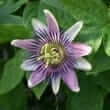Background
- The dried aerial parts of passion flower (Passiflora incarnata) have historically been used as a sedative and hypnotic (for insomnia) and for "nervous" gastrointestinal complaints. However, clinical evidence supporting any therapeutic use in humans is lacking. Early evidence suggests that passion flower may have a benzodiazepine-like calming action.
- Evidence for significant side effects is also unclear, and is complicated by the variety of poorly classified, potentially active constituents in different Passiflora species.
- Passion fruit (Passiflora
edulis Sims), a related species, is used to flavor food.
References
- Capasso A, Sorrentino L. Pharmacological studies on the sedative and hypnotic effect of Kava kava and Passiflora extracts combination. Phytomedicine 2005 Jan;12(1-2):39-45.
View Abstract - Dhawan K, Kumar S, Sharma A. Reversal of cannabinoids (delta9-THC) by the benzoflavone moiety from methanol extract of Passiflora incarnata Linneaus in mice: a possible therapy for cannabinoid addiction. J Pharm Pharmacol 2002;54(6):875-881.
View Abstract - Dhawan K, Kumar S, Sharma A. Suppression of alcohol-cessation-oriented hyper-anxiety by the benzoflavone moiety of Passiflora incarnata Linneaus in mice. J Ethnopharmacol 2002;81(2):239-244.
View Abstract - Dhawan K, Sharma A. Antitussive activity of the methanol extract of Passiflora incarnata leaves. Fitoterapia 2002;73(5):397-399.
View Abstract - Dhawan K, Kumar S, Sharma, A. Antiasthmatic activity of the methanol extract of leaves of Passiflora incarnata. Phytother Res 2003;17(7):821-822.
View Abstract - Dhawan K, Kumar S, Sharma A. Aphrodisiac activity of methanol extract of leaves of Passiflora incarnata Linn in mice. Phytother Res 2003;17(4):401-403.
View Abstract - Giavina-Bianchi PF Jr, Castro FF, Machado ML, et al. Occupational respiratory allergic disease induced by Passiflora alata and Rhamnus purshiana. Ann Allergy Asthma Immunol 1997;79(5):449-454.
View Abstract - Gow PJ, Connelly NJ, Hill RL, et al. Fatal fulminant hepatic failure induced by a natural therapy containing kava. Med J Aust 5-5-2003;178(9):442-443.
View Abstract - Hidaka M, Fujita K, Ogikubo T, et al. Potent inhibition by star fruit of human cytochrome P450 3A (CYP3A) activity. Drug Metab Dispos 2004 Jun;32(6):581-3.
View Abstract - Kapadia GJ, Azuine MA, Tokuda H, et al. Inhibitory effect of herbal remedies on 12-O-tetradecanoylphorbol-13-acetate-promoted Epstein-Barr virus early antigen activation. Pharmacol Res 2002;45(3):213-220.
View Abstract - Krenn L. [Passion Flower (Passiflora incarnata L.)--a reliable herbal sedative]. Wien Med Wochenschr 2002;152(15-16):404-406.
View Abstract - Mourvaki E, Gizzi S, Rossi R, et al. Passionflower fruit-a "new" source of lycopene? J Med Food 2005 Spring;8(1):104-6.
View Abstract - Smith GW, Chalmers TM, Nuki G. Vasculitis associated with herbal preparation containing Passiflora extract. Br J Rheumatol 1993;32(1):87-88.
View Abstract - Talcott ST, Percival SS, Pittet-Moore J, et al. Phytochemical composition and antioxidant stability of fortified yellow passion fruit (Passiflora edulis). J Agric.Food Chem 2-12-2003;51(4):935-941.
View Abstract - Werneke U, Turner T, Priebe S. Complementary medicines in psychiatry: review of effectiveness and safety. Br J Psychiatry 2006 Feb;188:109-21.
View Abstract







